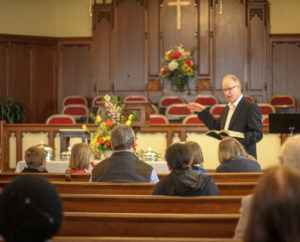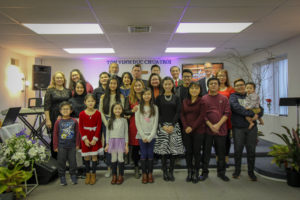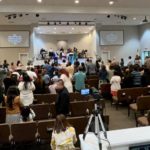

When he’s not coaching church planters or mentoring young pastors, Kim Grueser leads Pittsburgh Baptist Church members to become multiplying disciples.
And on Thursdays, he disciples people who live in a part of Pittsburgh that has about eleven thousand residents and not a single church.
“The value of discipleship is anchored in the Great Commission, which tells us to go and make disciples,” Grueser told SBC LIFE. “The Great Commandment to love God and our neighbors is validated when we make disciples.”
Other facets of the church are its ministry to ethnic congregations, and to church planting.
“Pittsburgh Baptist Church has always had a heart for church planting,” Grueser said. “In 1959 it was about the first [Southern Baptist] church in Pennsylvania, and in its first twenty years, it was involved in seventeen church plants. . . .
“We’ve partnered with five church plants in the twelve years I’ve been here,” Grueser, who is on the SBC Executive Committee, said. “We’ve sent at least sixteen members to church plants.”
Pittsburgh Baptist Church is a Multiplying Church Center (MCC) for the Baptist Resource Network of Pennsylvania/South Jersey. An MCC possesses “a strong system of discipleship and leadership development,” one that “demonstrates the responsibility to help them succeed,” according to the regional convention’s website.
“Probably the most important aspect we’ve been involved in is sending members with the plants when they launch,” Grueser said. “It’s an expensive gift. We sent ten members at once with one plant, and were averaging 130 in worship. That was over two years ago and now we’re averaging ninety-two.” Limited parking at the church’s building is also a challenge, he said.
Nonetheless, the church also readily opens its doors to ethnic congregations. A Ukrainian congregation meets Sunday afternoons at Pittsburgh Baptist; a Vietnamese congregation meets in the chapel Sunday mornings; a Tamil (East Indian) congregation meets once a month; a Bhutanese congregation recently went out on its own; and Grueser plans to go to Nepal in August to do pastor training and connect with a pastor there who might be interested in leading the “fairly vibrant” group of Nepalese in Pittsburgh.
More of Grueser’s time, however, revolves around coaching church planters and mentoring pastors. A coach and planter have a “very structured” coaching relationship that has a specific beginning and end, with about six one-hour telephone conversations over a four- to five-month semester, Grueser explained.

“In coaching, I’m drawing out of a church planter how they would solve an issue, build a strategy, handle a problem, deal with a situation,” the veteran pastor continued. “It’s a very effective method of helping planters realize they know more than they think they know. You have to ask good questions and be an excellent listener. I have to listen to what they’re saying and not saying to ask good questions.”
Grueser’s mentoring relationships are much more informal and open-ended, as a long-time pastor offering wise counsel out of his experience to pastors with whom he has developed personal relationships. Grueser has been a mentor to several of the pastors in the Pittsburgh area, and a coach for area church planters, said David Ludwig, the Baptist Resource Network’s associate director of healthy churches.
“We believe there are fourteen million people in Pennsylvania and the southern part of New Jersey who don’t know Jesus as their personal savior, so church planting is a big effort in our state,” Ludwig said. “We desire for all our churches to be healthy and Kim helps with both planters and pastors.”
In 2017, Grueser approached Pittsburgh Baptist with an additional way to be effective Kingdom growth agents.
“We were looking for ways to impact the most dangerous parts of our city,” Grueser said. “Two years ago I implemented ‘House2House Ministry,’ to meet in peoples’ homes in these areas because the churches have all left and traditional church planting doesn’t work.
“I asked the Lord to send a person of peace to bridge the gap between the church and the community,” the pastor continued.
The Sunday Grueser introduced House2House Ministry to the congregation, an infrequent visitor asked to speak. “[The visitor] told the church he was from that community, was raised in it and knows everybody in it, and if we are serious, he would help,” Grueser said. “That was a pretty clear affirmation this ministry was a step we should take.”
House2House Ministry started in February 2017, and as of January 2018 had baptized sixteen people. Today the group being discipled meets in a funeral home.
Grueser said he is praying for more “people of peace” to open their homes elsewhere in the targeted community some three miles north of Pittsburgh Baptist.
“The goal is to create a network of disciple-making outposts in these very spiritually dry and underserved communities around us,” the pastor explained. “We want people to stay in their communities and reach others, discipling them in their community.
“The people we’re reaching are very far from God in that few of them ever had a Bible, been to Sunday School, or anything except a funeral in regard to being in church,” Grueser continued. “We start with the very basics, what it means to be lost, to be saved, how to worship. . . . We want them to learn to reach people where they are.”
Pittsburgh Baptist gives 11.5 percent of undesignated offerings to missions through the Cooperative Program. “That’s what you do when you’re grateful for what God has done,” Grueser said. The church is 2.5 miles south of the center of town, in an area with about fifty thousand residents within a one-mile radius of the church.
Grueser also works five days a week as a chaplain for “probably the largest senior adult community in Pittsburgh,” the pastor said. The facility has four hundred residents, 450 employees, and two hundred volunteers.
And in his spare time, Pastor Grueser trains for marathons.
“My guiding principle is that small churches can make a significant impact for the Kingdom, in church planting, in missions, and in your community,” Grueser said. “You just have to be willing to work hard.”














